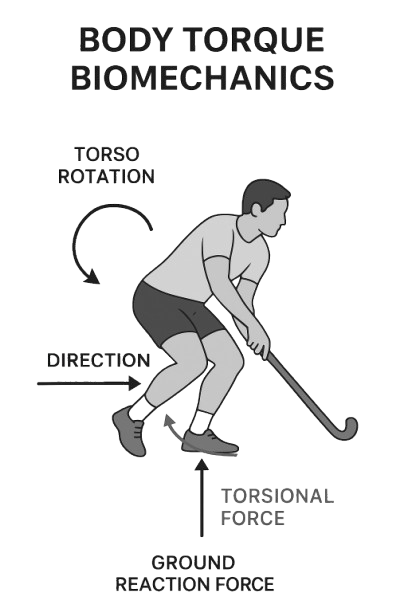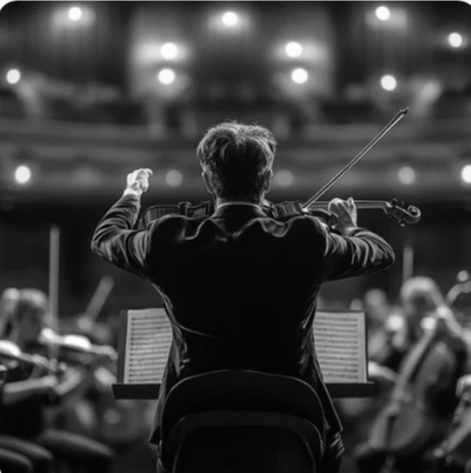This article builds on our original training-focused piece and reframes body torque as a central engine of hockey performance.
We link biomechanics & injury data directly to playing realities: power generation, deception, stick–ball control, neuromechanics, and resilience.
As usual, we tap into hockey-specific research — including drag-flick and hitting mechanics , expanding it with broader sports science on rotational power and kinetic chain organisation.
Discover how speed, power, agility, vision, proprioception, and hand–eye coordination weave together into a single neuromuscular symphony. This article reveals the science behind motor unit recruitment, elastic recoil, reflex loops, and perceptual anchoring — and shows how tailored training can transform raw force into fluid control. Whether you’re chasing peak velocity, sharper cuts, or longevity in masters play, the harmonic model offers a roadmap to elevate your game and sustain performance.
Reaction time in hockey isn’t just about being quick — it’s a chain of skills under pressure. From spotting the ball or puck early to making split‑second decisions and executing with precision, every link matters. Age inevitably reshapes these abilities, but the science shows they can be trained. Vision, cognition, neuromuscular speed, and movement economy all offer levers to keep performance sharp
The science of first touch is inseparable from the science of perception. Before the ball arrives, the player’s ability to pre‑scan the environment—looking up to identify teammates, opponents, and available space, within the context of the game situation —has been shown to predict performance outcomes.
Arousal is the invisible accelerator of performance — the physiological and psychological ignition that can propel athletes into peak states or derail them entirely. From heart rate and cortisol surges to the subtle distractions of mobile notifications and multimedia overload, athletes rarely step onto the field at a neutral baseline. The challenge for coaches and players is not whether arousal exists, but how to regulate it: keeping activation within the individual’s optimal zone so that energy sharpens focus rather than fragments it. Contemporary sport science shows that unmanaged arousal amplifies anxiety, impairs decision‑making, and erodes fine motor control, while tailored routines, mindfulness cues, and digital hygiene can transform it into a competitive advantage.
Cliques are not trivial — they are psychosocial defense mechanisms born of insecurity. In all levels of hockey including masters they are a skidmark on the laundry of the game. Left unchecked, they corrode trust, damage outsiders, and drag down performance. Leaders must deliberately dismantle exclusivity and replace it with inclusive structures, rituals, and norms that make belonging universal.
In our game, the ability to strike with speed and precision — whether it’s a slap hit, backhand, or aerial — is not simply a matter of muscular strength and power. It is the integration of strength and mobility across the kinetic chain that allows players to generate whip (torque), transfer force efficiently, and reduce injury risk. Too often, players pursue strength in isolation, overlooking the mobility that unlocks its transfer and the overriding importance of optimal technique allied to an understanding of the most suitable movement patterns or biomechanics.
Playing tournaments in extreme heat where you may face 6-7 games in 10 days or so and on- turf temperatures can rocket past 40 degrees C is not just competition—it’s a physiological siege. Extreme heat doesn’t just drain fluids; it reshapes how the body performs, recovers, and adapts. For athletes and coaches, understanding how to use and adapt the necessary full spectrum recovery programs in these conditions is essential to sustaining performance across a tournament block.









Hockey is lumped with other “field invasion sports,” as if it shares the exact same neural demands as football or rugby. It doesn’t. It’s a sport where a hard projectile can travel faster than most athletes can process, manipulated via a one‑metre lever in a compressed space with 360° threats. That combination makes hockey one of the most Central Nervous System (CNS) ‑ hostile sports currently played. It is simply not football, and constantly copying and pasting sports science memes across to hockey is a seriously flawed practice.
Football clubs like Arsenal now use CNS‑priming warm‑ups that blend low‑load explosive work, scanning, and partner‑coordination drills to “switch on” the system without fatigue. That’s a great baseline. But for hockey, it’s not enough. This article builds the case—neuroscientifically and practically in detail—for full‑range CNS activation in hockey as an integral part of training and pre-match priming of integrated body systems.